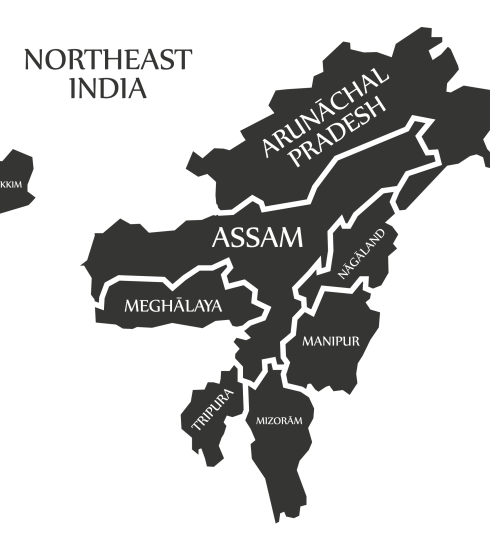Assam Police Bust ABT Sleeper Cells; India on High Alert
In a significant breakthrough, the Assam Police’s Special Task Force (STF) has busted fresh terror modules affiliated to the Ansarul Bangla Team (ABT), a known associate of Al-Qaeda in the Indian Subcontinent (AQIS). The bust, which took place in Assam, West Bengal, and Kerala, comes amid heightened concerns about potential terror activities following recent developments in Bangladesh after the fall of the Sheikh Hasina regime.
Senior officials in Indian security agencies have been closely watching events unfolding across the border. According to intelligence sources, there were growing apprehensions that Islamist extremists in Bangladesh could try to expand their footprint into Indian territory, particularly in the border-sharing states of Assam and West Bengal.
Operation ‘Pragat’: A Coordinated Strike
The multi-state operation, code-named Pragat (meaning “strike”), was planned and executed over the last two weeks with meticulous intelligence gathering. The STF collaborated with central agencies, as well as police units in West Bengal and Kerala, to track down and apprehend key operatives.
Speaking to reporters in Guwahati, Harmeet Singh, Special DGP, Assam Police, confirmed that eight individuals were arrested in simultaneous raids. “We have strong evidence that these individuals were part of separate sleeper cells tasked with planning violent and subversive activities. Their aim was to assassinate specific targets, disrupt communal harmony, and destabilize not just Assam and Bengal, but other regions across India.”
Key Arrests and Named Suspects
Among the eight arrested, Nurul Islam has been identified as a prime suspect. He was previously apprehended in 2015 for subversive activities linked to ABT but was out on bail. According to police sources, Nurul Islam is believed to be in direct contact with handlers in Bangladesh.
Officials have withheld full details on the other suspects for operational reasons. However, sources confirm that they include operatives with varying roles in logistics, recruitment, and planning. Investigators are scrutinizing digital devices—including four pen drives—that were seized during the raids, hoping they will reveal additional identities and specific details of planned attacks.
Kerala Arrest Points to Wider Network
One of the most critical arrests was made in Kerala, underscoring the possibility of a broader, pan-India network. “The fact that a suspect moved from Assam and West Bengal to Kerala shows the modules’ intent to expand beyond the Northeastern region,” said a senior officer involved in the raids.
Police believe the group may have set up sleeper cells in multiple states, aiming to unleash “violent and subversive activities” at an opportune moment. Forensic experts are analyzing electronic evidence to uncover further links and future plots.
International Handlers
During the press briefing, Mr. Singh revealed that the busted network had direct links to ABT’s leadership in Bangladesh and handlers in Pakistan. The ABT is an affiliate of AQIS, a globally proscribed terrorist organization.
“The arrests confirm our worst fears about transnational terror groups trying to radicalize and recruit youth in India. These outfits are setting up sleeper cells to carry out coordinated attacks,” said a senior intelligence official.
Chief Minister Takes Note
Top government functionaries, including the Chief Minister of Assam, are closely monitoring the investigation. Police teams are already coordinating with central agencies to trace any additional suspects. “The operation is still ongoing. Whenever fresh leads point us beyond Assam, we will immediately seek assistance from the relevant state police forces and central agencies,” Mr. Singh added.
Border States on High Alert
The arrests have put border-sharing states on high alert. Assam and West Bengal, which share long and porous borders with Bangladesh, have ramped up vigil to detect any potential infiltration. Security experts warn that the fallout from political developments in Bangladesh could have ripple effects if terror outfits use the situation to bolster their networks in India.
“The success of Operation Pragat highlights the importance of inter-state coordination and real-time intelligence sharing. This is just the beginning. More arrests could follow as we decode digital evidence and gather further leads,” said a senior Assam Police official on the condition of anonymity.
Way Forward
While a significant blow has been dealt to the ABT’s clandestine operations, officials caution that similar sleeper cells might still be at large. Security agencies are determined to intensify crackdowns and dismantle any remaining networks. As the investigation unfolds, more details on the group’s plans, finances, and local enablers are expected to emerge.
With border states remaining on edge and intelligence agencies tightening security protocols, the Assam Police’s recent success offers a renewed sense of vigilance. Yet, the larger challenge of thwarting transnational terror threats remains a priority for all enforcement and intelligence bodies across India.






